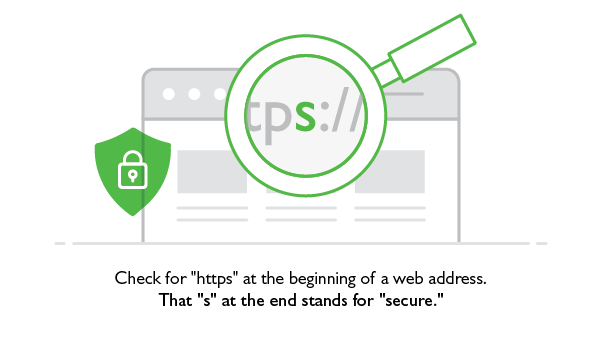The holidays are a time for relaxing, spending time with loved ones and, often, giving to the less fortunate. However, despite your good intentions this holiday season, be sure to keep your guard up when donating or buying gifts.
Scammers and fraudsters don’t hibernate in winter, so avoiding scams is just as important during the holiday season to protect your bank account.
You can safeguard your finances with the help of the many fraud tools that Bank Midwest offers. Plus, here are some general tips for staying safe during the festive season from threats like phishing emails, fake charities and identity theft.

Be secure when shopping online for gifts
For many, ecommerce will be their go-to method for holiday shopping during the pandemic and beyond. While online buying offers many benefits, like convenience, there are also drawbacks. Cybercriminals are increasingly active, and you should take all steps necessary to protect your credit card and personal information.
Some of these simple actions to take include:
- Using strong, unique passwords for your online shopping accounts. If it helps, you can use a password manager to keep track of all those complex passwords and even create stronger ones.
- Checking for “https” at the beginning of the web address for the virtual store. That “s” at the end stands for “secure,” so you can rest easy while shopping. Never give your credit card information to a site without that “s.”
- Researching the company before you make a purchase. Doing your due diligence helps ensure you’re buying from a reputable retailer. You can check that the organization is listed with the Better Business Bureau, or read customer reviews on popular websites.
Beware of fake charities
Many people like to make donations around the season. But while there are many worthy organizations that could use your support, there are also bound to be unscrupulous fraudsters looking to take advantage of the generosity of others.
Fake charities are a persistent holiday scam to stay alert of. So if you’re considering giving to a new organization, be sure to get all the information you can. This includes going to the web address to see if the charity is legit. You could also request to speak with others in the organization for reassurance. If none can be provided, that might be a red flag.
The biggest red flag is a direct communication pressuring you to donate now. If you want to be avoid sending money to fake charities, the Federal Trade Commission recommends:
- Reading reviews and ratings.
- Asking for proof of efforts or good works, or how your donation will be used specifically.
- Never paying with a wire transfer or gift card.
Utilize identity theft prevention best practices
The steps you take to prevent identity theft on a daily basis shouldn’t be forgotten during the holiday season, no matter how many cookies there are to bake.
You need to stay alert during these times, maybe more so than others, because of the range of holiday scam attempts you could encounter.
To be entirely safe, follow this tips:
- Do not click on a link from an email address you don’t recognize. Exercise the same caution if you’re texted a link from a number that isn’t familiar to you.
- Be cautious of emails that don’t have a link, but ask for your personal information. These can be phishing emails too, and your bank or another business you work with won’t usually ask directly for such information.
- Think twice about holiday shopping deals that are too good to be true. They could be fraud attempts.
Never buy a gift card for payment
One recommendation the Federal Trade Commission emphasizes is to never buy a gift card to use as a means of payment. While gift cards can certainly delight your friends and family, they can also make a fraudster’s heart warm if you end up sending them a gift card as they requested.
Some scammers may contact you and ask that you immediately buy a gift card as a form of payment for some event or bill they make up. While it can seem far-fetched, such scams can be effective. A threat from what seems to be your utility company to shut off the lights during the holidays can make anyone concerned.
However, scammers rely on gift cards because their use leaves little trail. A general rule of thumb is that anybody who contacts you and demands such a form of payment is odds-on a scammer to avoid, and report if necessary.
Check in on elderly relatives
Not only do you want to protect your own finances during this time of year, but also those of your relatives. Unfortunately, seniors are often targeted by scammers during the holiday season. It may be beneficial to check up on family to ensure they’re staying safe, asking them if they’re encountered any unusual request.
And if you’re a financial caregiver for a relative, the Consumer Financial Protect Bureau has some resources that can help you during this time of year.
Stay safe this holiday season with Bank Midwest’s help
The holidays are a time of cheer and goodwill, but falling victim to fraud this season can swiftly deflate the mood.
This year, rest comfortably knowing that Bank Midwest is committed to protecting you and your bank account. Our customers can use a variety of online and mobile tools, including fraud prevention features like instantly being able to lock a Bank Midwest debit card, set transaction maximums and receive mobile alerts.
To learn more about our personal banking products and services, please visit our website or contact us today to talk more about your banking needs and how to stay safe during the holiday season.
